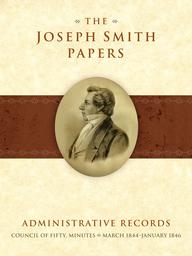
A new volume of never-before-published documents offers a candid view on how early Mormon leaders handled the temporal affairs of The Church of Jesus Christ of Latter-day Saints. The Joseph Smith Papers feature the minutes from the Council of Fifty meetings held in Nauvoo, Illinois, in the 1840s. The book is being released on September 26, 2016, by the Church Historian’s Press, an imprint of the Church History Department.
“The Council of Fifty was involved in matters such as exploring sites in the American West where the Saints could settle,” said Matthew J. Grow, one of the editors of the volume titled “Administrative Records, Council of Fifty, Minutes, March 1844–January 1846.” Possible locations for the migration included Texas, California, Wisconsin, Oregon and the Rocky Mountains.
The council was also involved in Church founder Joseph Smith’s 1844 presidential campaign. “This came about because efforts to get commitments out of the expected major candidates for the election of 1844 failed to find anybody who would stand up for Mormon rights,” explained editor Ronald K. Esplin. “The Council of Fifty became a forum for discussing Mormon and minority rights of every sort.”
The council was also involved in a variety of matters in Nauvoo, including the building of the Nauvoo Temple and in governing the city after the Illinois government took the city charter away from the Latter-day Saints.
Joseph Smith formed the council in March 1844, a few months prior to his death, to handle the temporal and political matters of the Church. It was initially made up of 23 members but was expanded to roughly 50 members, mostly prominent Church members. Three men who were not members of the Church were also included.
“Joseph Smith said he did this to make the point that in political matters, a man’s religion should not come into play,” said Grow. “He made very strong statements in the council about the importance of agency and how that related to religious liberty.”
Grow said Joseph Smith encouraged the participants to speak freely in council meetings and then come to unanimous decisions. “He told them he didn’t want to be surrounded by a set of ‘dough heads.’ By this he meant he didn’t want to be surrounded by people who wouldn’t share their real feelings.”
“I think one of the things that the Council of Fifty really demonstrates is how Joseph Smith used a system of councils,” he added.
The First Presidency, the Quorum of the Twelve Apostles, and other quorums and councils were separate from the Council of Fifty and continued to administer the Church’s ecclesiastical affairs, such as appointing officers and teaching doctrine.
| Temple Square is always beautiful in the springtime. Gardeners work to prepare the ground for General Conference. © 2012 Intellectual Reserve, Inc. All rights reserved. | 1 / 2 |
The minutes were compiled in three small bound volumes by William Clayton, who was appointed clerk of the Council of Fifty at its first meeting in Nauvoo. President Brigham Young brought the volumes to the Salt Lake Valley during the Mormon pioneer trek. The volumes have been in the custody of the Office of the First Presidency since the 1880s, when the Council of Fifty was disbanded, and were transferred to the Church History Department in 2010.
“Readers will learn how desperate the struggle really was for members of the Church who were seeking for refuge among the storm of anti-Mormon attacks and the political intrigues against the Church in 1844 and 1845,” said editor Gerrit Dirkmaat. “They will get to know, on a more personal level, men like Joseph Smith, Hyrum Smith, Brigham Young and John Taylor and see their hopes, dreams and aspirations. And they will be uplifted as they read it.”
The latest volume is part of Church’s ongoing effort to make every document produced by Joseph Smith and his scribes available to the public.
The print edition of “The Joseph Smith Papers” is expected to span more than 20 volumes when complete. It is divided into six series: Journals, Revelations and Translations, Histories, Documents, Administrative Records, and Legal and Business Records. The first volume of the project was published in 2008. For more information, visit josephsmithpapers.org.
The original minute books of the Nauvoo-era Council of Fifty will be on display at the Church History Library in a short-term exhibit from September 6 to October 7, 2016. Information about the Church History Library’s hours and location can be found at https://history.lds.org/article/chl-hours.
